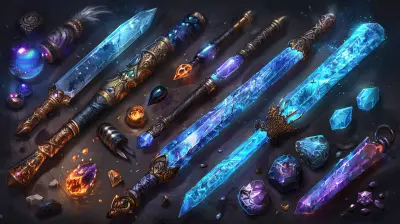The Rise of Cross-Platform Play and What It Means for Gamers
13 June 2025
Cross-platform play. Just a few years ago, it felt like the holy grail of gaming, didn’t it? Gamers on PlayStation, Xbox, PC, and even mobile were stuck in their own little eco-systems, unable to interact or play with friends who owned a different piece of plastic sitting under their TV. Fast forward to today, and the walls between platforms aren’t just cracking—they’re crumbling. So, what’s the deal with this sudden rise of cross-platform play, and more importantly, what does it mean for us gamers? Let’s dig into it.
What Exactly Is Cross-Platform Play?
Let’s start with the basics. Cross-platform play (or cross-play) is the ability for gamers using different gaming platforms to play with each other. This means your buddy on Xbox can finally hop into a match with you on your PS5. Throw in another friend who’s on PC, and you’ve got yourself the start of a squad.For years, playing across platforms felt like trying to invite cats and dogs to the same dinner party. Console manufacturers and developers all had their own walled gardens and weren’t too thrilled about opening the gates. Each company wanted your loyalty (and your wallet, let’s be real). But as the gaming industry has evolved, so have the demands of players. Suddenly, "Why can’t I play with my friends on a different console?" became a louder question.
Why Did Cross-Platform Play Suddenly Take Off?
1. The Players Demanded It
Look, gamers are a vocal bunch. We’ve been asking (okay, more like shouting) for cross-play for years. Multiplayer games like Fortnite, Call of Duty: Warzone, and Rocket League showed just how huge the audience could get when you unite players regardless of their platform. Developers couldn’t ignore the sheer numbers anymore.2. The Industry Evolved
Another big reason? The gaming industry grew up. Developers and publishers started realizing that cross-play wasn’t a threat to their business, but rather an opportunity. Why fight over who gets to host the party when you can all enjoy the cake together? Games as a service (GAAS) became the norm, and developers now focus more on keeping players engaged (and spending) rather than limiting who they play with.3. Technology Got Better
Let’s be real—cross-play wasn’t always a feasible option. There were technical hurdles. Different platforms had different infrastructures, matchmaking systems, and even hardware capabilities. But thanks to advancements in cloud computing, online servers, and game engines like Unreal Engine, those barriers are much easier to overcome now.
What It Means for Gamers: The Good, The Bad, and The Interesting
Okay, so cross-play is here, and it’s making waves. But how does it actually affect us gamers? It’s not all rainbows and perfect headshots. Let’s break it down.The Good Stuff
1. Playing with Friends Is Easier Than Ever
This is the no-brainer win. No more awkward conversations about which console to buy just so you can play with your friends. Whether you’re team Xbox, PlayStation, or PC Master Race, cross-play makes sure you’re all in the same digital sandbox.2. More People to Play With
Ever been stuck in a match lobby for what feels like forever, waiting for enough players to join? Cross-play fixes that by dramatically increasing the pool of available players. More players = faster matchmaking, fuller games, and, let’s face it, more chaos. Who doesn’t love a little chaos?3. Bang for Your Multiplayer Buck
Gamers invest a ton of time (and money!) into multiplayer games. Cross-platform play ensures that we get the most out of those investments. Player bases stay alive longer, which means you can keep enjoying your favorite game long after its initial hype has settled.The Not-So-Good Stuff
1. Balancing Can Be Tricky
Here’s the thing: not all platforms are created equal. A gamer on a PC with a mouse and keyboard will usually have an edge over someone playing on a console with a controller. Developers now have the unenviable task of trying to balance these differences. The solution? Many games separate PC and console players unless you’re in a party together. It’s not perfect, but it’s a start.2. Cheaters Gonna Cheat
Unfortunately, cross-play has made it easier for hackers and cheaters to ruin the fun. PC players, in particular, have a reputation for running mods or exploits, and now console players are often forced to deal with these same bad apples. Developers are cracking down with anti-cheat systems, but it’s still a challenge.The Interesting Side Effects
1. A Shift in Gaming Culture
Cross-play is doing more than just connecting platforms—it’s connecting communities. It’s breaking down the old rivalries between consoles. Well, mostly. (Let’s not pretend the Xbox vs. PlayStation debate isn’t still alive and kicking.) But as more players get comfortable gaming together, regardless of their platform, we’re seeing a more unified gaming culture.2. The Future Is Platform Agnostic
Ever notice how younger gamers don’t seem to care as much about what hardware they’re playing on? For them, the lines between platforms are blurring. The rise of cross-play is contributing to this shift. It’s becoming more about the games and less about the consoles. And honestly, isn’t that what gaming should be about?
What Does the Future Hold for Cross-Platform Play?
The rise of cross-play feels like just the beginning. With cloud gaming services like Xbox Cloud Gaming (formerly Project xCloud), Nvidia GeForce Now, and Google Stadia (RIP) paving the way, the concept of "platforms" might eventually disappear altogether. Imagine being able to play anywhere, on any device, with anyone. That’s the dream, right?Of course, there will still be challenges. Companies like Sony, Microsoft, and Nintendo will always have a bit of competition going on. But the success of cross-play shows that collaboration is good for everyone—developers, publishers, and, most importantly, gamers.
Final Thoughts
Cross-platform play has brought a breath of fresh air to the gaming world. It’s connecting friends, expanding multiplayer communities, and reshaping how we think about gaming. Sure, it’s not perfect—there are still balancing issues, cheater problems, and the occasional corporate drama—but the benefits far outweigh the drawbacks. In the end, cross-play is a win for all of us who just want to game with our friends, no matter where or how they play.So, the next time you grab your controller, mouse, or even smartphone, think about how far we’ve come. We’re in an era where gaming is more inclusive and accessible than ever. And honestly? That’s pretty freaking awesome.
all images in this post were generated using AI tools
Category:
Gaming NewsAuthor:

Madeleine McCaffrey
Discussion
rate this article
3 comments
Adeline Montgomery
Cross-platform play is revolutionizing gaming, uniting players across platforms and breaking down barriers. This shift empowers a global community, fosters camaraderie, and elevates our gaming experience to new heights!
June 19, 2025 at 3:35 PM

Madeleine McCaffrey
Absolutely! Cross-platform play is indeed transforming the gaming landscape, creating a more inclusive and connected community that enhances our overall gaming experience.
James Barron
Great insights on cross-platform play! It truly enhances the gaming experience and fosters a more inclusive community.
June 17, 2025 at 3:55 PM

Madeleine McCaffrey
Thank you! I'm glad you found the insights valuable. Cross-platform play really is a game-changer for fostering community and inclusivity in gaming.
Jacob McIlwain
Great article, exciting times!
June 17, 2025 at 4:56 AM

Madeleine McCaffrey
Thank you! I'm glad you enjoyed it! Exciting times indeed for gamers!



